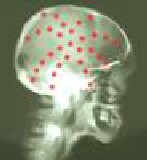- 8 Ways to Increase Dopamine Naturally
- 7 Best Breads for Maintaining Stable Blood Sugar
- Gelatin vs. Collagen: Which is Best for Skin, Nails, and Joints?
- The Long-Term Effects of Daily Turmeric Supplements on Liver Health
- Could Your Grocery Store Meat Be Causing Recurring UTIs?
- Are You Making This Expensive Thermostat Error This Winter?
- Recognizing the Signs of Hypothyroidism
- 10 Strategies to Overcome Insomnia
- Could Artificial Sweeteners Be Aging the Brain Faster?
- Techniques for Soothing Your Nervous System
Scans Show Brain-Connection Differences in Those With Epilepsy


People with a certain type of epilepsy have widespread, abnormal brain connections that could provide clues for diagnosis and treatment, new research suggests.
The study included 24 people with left temporal lobe epilepsy, the most common form of focal (partial) epilepsy. Partial seizures do not involve the entire brain. People with temporal lobe epilepsy experience seizures that start in the temporal lobe. These are located on each side of the brain, just above the ears.
Researchers used MRI to compare the brains of the epilepsy patients and a group of 24 people without epilepsy. Epilepsy patients had 22 percent to 45 percent fewer long-range connections in the brain’s “default-mode network” compared to people without the condition.
This set of brain regions is active when the mind is at rest and allowed to wander or daydream.
The epilepsy patients also had 85 percent to 270 percent more local connections within and beyond the default-mode network. This may be an adaptation to having fewer long-range connections, noted the study authors.
The findings are published in the Nov. 19 online edition of the journal Radiology.
“Our long-term goal is to see if we can we predict . . . who will respond to surgery and who will not,” Dr. Steven Stufflebeam, of Massachusetts General Hospital, said in a journal news release.
More information
The U.S. Centers for Disease Control and Prevention has more about epilepsy.
Source: HealthDay
Copyright © 2026 HealthDay. All rights reserved.










